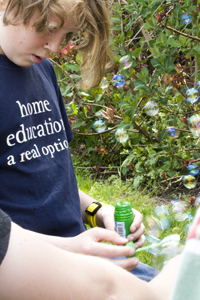We are current searching for a new house, which has set me thinking – what makes a great home ed house?
Location? We want to be on a bus route that takes us to the places we want to go – friends and libraries and group, with a good local grocery shop. We also don’t want to walk as far as we do now to some wilder green space, and a handy playground would be a bonus.
On the outside we want a big enough garden for a trampoline, some space to run and do a bit of gardening too, with access fromt he outside for all the muddy bikes and things. An easy to use access from inside the house too, to encourage us all to get out there and enjoy the outdoors more.
We have been finding that many houses have only one medium sized or smallish reception room, but three bedrooms. As a family that work and play together I would much rather prefer that we spend time together downstairs than hiding upstairs in bedrooms! Bedrooms should be for sleeping, and having a little quiet or private time rather than playing or making. So more downstairs space than upstairs!
As for the living space – we want wall space for shelves and display – all those posters, maps and artwork that we produce. A place to watch TV or play with playmobil, lego or other toys. And space for two or three people to play on the computer/laptop at the same time. Would much prefer hard flooring – more fun for playing on, things stand up better and so much easier to keep clean, especially with paint. play dough etc.
Plus of course, table space for baking, making, playing, eating, chatting. We have seen a house with a lovely kitchen/diner. A big breakfast bar, as big as a table so that we can cook and make together, plus space for dining room table and chairs too.

